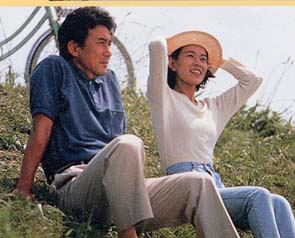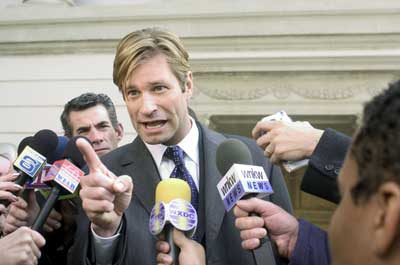Friday, June 02, 2006
Air Conditioner breakdown boosts “An Inconvenient Truth”

The film company Paramount Vantage did not hire the air conditioning repairman to mess with the cinema thermostat nor did they break the central air system in the first place. But it would have made for brilliant publicity if they had thought of it. The one movie that benefits from a stifling cinema is director David Guggenheim’s “An Inconvenient Truth,” an elaborate documentary about former Vice President Al Gore and his efforts to inform people about global warming.
The air conditioning was promptly fixed by the tightening of a loose wire. Still, the unseasonably stifling temperatures outside the Cincinnati screening room continued to give an extra boost to Gore’s warnings about rising carbon dioxide and resulting hotter and hotter temperatures.
The outdoors climax occurred soon after the documentary ended and the press returned to their cars. Ferocious thunderstorms brought torrential rain and heavy winds to the Cincinnati area. It’s as if Gore’s multimedia lecture, the core of Guggenheim’s earnest film, came to life with a climactic thunderclap.
Now, I’m not saying Paramount Vantage manipulated the weather to better promote “An Inconvenient Truth.” If they could, if it was at all possible, “An Inconvenient Truth” could turn into the movie of a lifetime. Of course, Al Gore would call it a coincidence destined to become more likely unless the movie inspires people to create real, environmental change.
Wednesday, May 31, 2006
Remembrance: Japanese Filmmaker Shohei Imamura

Japanese filmmaker Shohei Imamura referred to his films as "messy," but that's not the word I would use to describe his extraordinary movies, from recent dramas like “The Eel” (shown above) to earlier work like his acclaimed 1966 film “The Pornographers.”
News agencies today reported the death of Imamura from liver cancer. He was 79 and the tragedy is how death of word-of-mouth support for foreign-language cinema, or any independent film for that matter, prevented Imamura from gaining widespread acclaim in the U.S.
Imamura created the best segment in the controversial omnibus film “11'09"01,” telling the fairy-tale-like story of a Japanese World War II soldier who returns to his village devastated by his battle experiences. As a result, he begins to act like a snake, much to the horror of his family.
In his last feature film, the 2001 fantasy “Warm Water Under a Red Bridge,” a laid-off businessman Yosuke (Koji Yakusho) goes in search of a golden Buddhist statue, allegedly hidden in a house by a red bridge. Upon arriving, Yosuke meets and becomes obsessed with Saeko (Misa Shimizu), a woman who secretes magical waters during sex.
In all his films, Imamura showed Japan's underbelly, its lowlifes and perverts. Maybe that’s what he meant by describing his films as “messy.” Yet, Imamura always portrayed his characters respectfully, no matter their predicaments.
Proof of Imamura’s master status lies with the fact that he is one of only four filmmakers to to win the Palme d’Or twice, for “The Eel” in 1997 and “The Ballad of Narayama” in 1983.
It’s worth mentioning that European filmmaker Emir Kusturica, another member of this gang of four, has yet to create a sizable profile in the United States.
Imamura’s death notices may not attract much U.S. news coverage but postwar Japanese cinema is as much about Imamura and his sensuous stories as any Akira Kurosawa Samurai epic.
In honor of Imamura’s recent passing, watch one of his films and you’ll agree.
Tuesday, May 30, 2006
Let Us Now Praise: Aaron Eckhart

Hollywood’s summertime blockbusters, whether ‘The Da Vinci Code’, ‘Over the Hedge’ or ‘X-Men: The Last Stand,’ continue to rack up gigantic box office with machinelike precision. It’s as if a new record is made every weekend.
The lone specialty film that qualifies as a break out hit is the hilarious political satire ‘Thank You for Smoking.’
Christopher Buckley’s comic novel has a joke for everyone and neophyte director Jason Reitman shows a knack for generating laughs equal to his filmmaker father, Ivan Reitman. But much of the credit for the film’s crossover success belongs to leading man Aaron Eckhart.
There’s no better character for a comedy than someone who talks for a living. Nick Naylor (Eckhart), lobbyist for the Academy of Tobacco Studies, faces his teenage son’s classmates and compares what he does to a movie star. The way he sees things, he and Brad Pitt both make their living performing in front of the public.
Naylor has a simple message for the kids, challenge authority. The qualifier is to make money while challenging the powers-that-be, in Naylor's case, protecting the interests of the tobacco companies.
Eckhart is the longtime muse of playwright/filmmaker Neil LaBute — ‘Your Friends & Neighbors,’ ‘Nurse Betty,’ ‘Possession’ and ‘In the Company of Men,’ as the womanizer Chad. But he puts his smarmy personality and blonde, prep school looks to comical use as the ruthless lobbyist.
Eckhart has worked on his share of Hollywood blockbusters, action thrillers ‘Paycheck,’ ‘The Core’ and dramas like ‘The Missing’ and ‘Erin Brockovich’ but more independent fare attracts his interest. Eckhart would be a welcome addition to any mainstream movie but he shines in films with an alternative edge, a film like ‘Thank You for Smoking.’
Spin control is seldom this funny and Eckhart is the most handsome chatterbox imaginable.